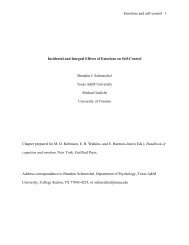A cognitive control perspective of self-control strength - ResearchGate
A cognitive control perspective of self-control strength - ResearchGate
A cognitive control perspective of self-control strength - ResearchGate
You also want an ePaper? Increase the reach of your titles
YUMPU automatically turns print PDFs into web optimized ePapers that Google loves.
200 A Cognitive Control Perspective<br />
Posner, M. I., & Raichle, M. E. (1994). Images <strong>of</strong> Mind. New York: Scientific American Books.<br />
Rabbitt, P. (1979). How old and young subjects monitor and <strong>control</strong> responses for accuracy and speed. British Journal<br />
<strong>of</strong> Psychology, 70, 305–311.<br />
Rainville, P., Duncan, G. H., Price, D. D., Carrier, B., & Bushnell, M. C. (1997). Pain affect encoded in human<br />
anterior cingulate but not somatosensory cortex. Science, 277, 968–971.<br />
Richeson, J. A., & Shelton, J. N. (2003). When prejudice does not pay: Effects <strong>of</strong> interracial contact on executive<br />
function. Psychological Science, 14, 287–290.<br />
Robinson, M. D. (2007). Gassing, braking, and <strong>self</strong>-regulating: Error <strong>self</strong>-regulation, well-being, and goal-related<br />
processes. Journal <strong>of</strong> Experimental Social Psychology, 43, 1–16.<br />
Robinson, M. D., Ode, S., Wilkowski, B. M., & Amodio, D. M. (2007). Neurotic contentment: A <strong>self</strong>-regulation<br />
view <strong>of</strong> neuroticism-linked distress. Emotion, 7, 579–591.<br />
Robinson, M. D., Pearce, E. A., Engel, S. G., & Wonderlich, S. A. (2009). Cognitive <strong>control</strong> moderates relations<br />
between impulsivity and bulimic symptoms. Cognitive Therapy and Research, 33, 356–367.<br />
Saint-Cyr, J. A., Bronstein, Y. L., & Cummings, J. L. (2002). Neurobehavioral consequences <strong>of</strong> neurosurgical treatments<br />
and focal lesions <strong>of</strong> frontal-subcortical circuits. In D. T. Stuss & R. T. Knight (Eds.), Principles <strong>of</strong> Frontal<br />
Lobe Function (pp. 408–427). New York: Oxford University Press.<br />
Sanders, A. F. (1998). Elements <strong>of</strong> Human Performance: Reaction Processes and Attention in Human Skill. Mahwah, NJ:<br />
Lawrence Erlbaum Associates.<br />
Sarter, M., Gehring, W. J., & Kozak, R. (2006). More attention must be paid: The neurobiology <strong>of</strong> attentional<br />
effort. Brain Research Reviews, 51, 145–160.<br />
Schmeichel, B. J. (2007). Attention <strong>control</strong>, memory updating, and emotion regulation temporarily reduce the<br />
capacity for executive <strong>control</strong>. Journal <strong>of</strong> Experimental Psychology: General, 136, 241–255.<br />
Schmeichel, B. J., & Baumeister, R. F. (2004). Self-regulatory <strong>strength</strong>. In R. F. Baumeister & K. D. Vohs (Eds.),<br />
Handbook <strong>of</strong> Self-Regulation: Research, Theory, and Applications (pp. 84–98). New York: Guilford Press.<br />
Schmeichel, B. J., Vohs, K. D., & Baumeister, R. F. (2003). Intellectual performance and ego depletion: Role <strong>of</strong><br />
the <strong>self</strong> in logical reasoning and other information processing. Journal <strong>of</strong> Personality and Social Psychology, 85,<br />
33–46.<br />
Schmeichel, B. J., Volokhov, R. N., & Demaree, H. A. (2008). Working memory capacity and the <strong>self</strong>-regulation<br />
<strong>of</strong> emotional expression and experience. Journal <strong>of</strong> Personality and Social Psychology, 95, 1526–1540.<br />
Skinner, B. F. (1963). Behaviorism at fifty. Science, 140, 951–958.<br />
Tangney, J. P., Baumeister, R. F., & Boone, A. L. (2004). High <strong>self</strong>-<strong>control</strong> predicts good adjustment, less pathology,<br />
better grades, and interpersonal success. Journal <strong>of</strong> Personality, 72, 273–322.<br />
Thayer, R. E. (2001). Calm Energy. New York: Oxford University Press.<br />
van Veen, V., & Carter, C. S. (2002). The anterior cingulate as a conflict monitor: fMRI and ERP studies. Physiology<br />
and Behavior, 77, 477–482.<br />
van Veen, V., & Carter, C. S. (2006). Conflict and <strong>cognitive</strong> <strong>control</strong> in the brain. Current Directions in Psychological<br />
Science, 15, 237–240.<br />
Vohs, K. D., Baumeister, R. F., & Ciarocco, N. J. (2005). Self-presentation: Regulatory resource depletion impairs<br />
impression management and effortful <strong>self</strong>-presentation depletes regulatory resources. Journal <strong>of</strong> Personality and Social<br />
Psychology, 88, 632–657.<br />
Watson, J. B. (1913). Psychology as the behaviorist views it. Psychological Review, 20, 158–177.<br />
Wilkowski, B. M., & Robinson, M. D. (2008a). Putting the brakes on antisocial behavior: Secondary psychopathy<br />
and post-error adjustments in reaction time. Personality and Individual Differences, 44, 1807–1818.<br />
Wilkowski, B. M., & Robinson, M. D. (2008b). Guarding against hostile thoughts: Trait anger and the recruitment<br />
<strong>of</strong> <strong>cognitive</strong> <strong>control</strong>. Emotion, 8, 578–583.<br />
Wilkowski, B. M., Robinson, M. D., & Meier, B. M. (2006). Agreeableness and the prolonged spatial processing<br />
<strong>of</strong> antisocial and prosocial information. Journal <strong>of</strong> Research in Personality, 40, 1152–1168.<br />
Wilkowski, B. M., Robinson, M. D., & Troop-Gordon, W. (2009). How does <strong>cognitive</strong> <strong>control</strong> reduce anger and<br />
aggression: The role <strong>of</strong> forgiveness processes. Manuscript submitted for publication.<br />
Williams, J. M. G. (2008). Mindfulness, depression and modes <strong>of</strong> mind. Cognitive Therapy and Research, 32, 721–<br />
733.<br />
ª 2010 The Authors Social and Personality Psychology Compass 4/3 (2010): 189–200, 10.1111/j.1751-9004.2009.00244.x<br />
Journal Compilation ª 2010 Blackwell Publishing Ltd



